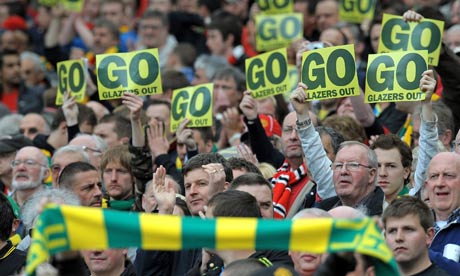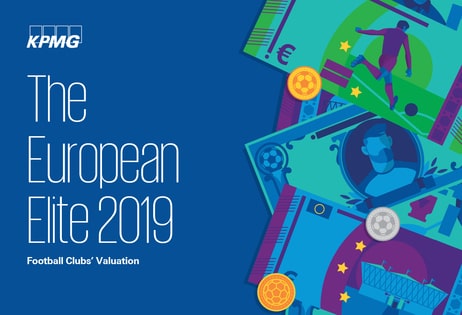Last night , and throughout this season, there have been fewer protests, and the defiant green and gold symbol of the club's original colours and working-class values became less visible. All the issues the Manchester United Supporters Trust (Must) and other fans' groups protested about in a well-informed campaign remain true. The Glazers, with no previous connection to United or English football, really were allowed, by United's availability on the London stock market and football's lack of regulation, to buy one of the world's greatest football clubs and load it with £525m of debt.
This debt was not borrowed by the club to invest in an academy or expand Old Trafford – that was done with cash made in the previous 13 years of Premier League success. The £525m was the Glazers' own borrowing to buy United, then they loaded their debt mountain on to the club itself to repay the debt and interest. Perhaps the most staggering perspective on this is to understand that in interest, fees paid to bankers, lawyers and accountants, and other hits of finance charges, the Glazer takeover has cost United more than £550m. Yet even after paying all that, United still have £420m debt derived from the Glazers' takeover.
In 2011-12, even with the crowd more resigned to it all, United paid £50m in interest on this debt. The Glazers paid themselves a £10m dividend, to pay off the £10m loan they borrowed from United in 2010, £1.6m by each of Malcolm Glazer's six children. The club paid a £3m management fee to the Glazers' company and Kevin Glazer, one of Malcolm's five sons, was owed £558,484 interest, having bought up some of United's debt for himself.
While United fans raged, informed by those with professional expertise such as Andy Green, the investment analyst who chronicled all the eye-watering details on his Andersred blog there was silence from the Premier League and Football Association. Now, with Sir Alex Ferguson's latest United team claiming the title, there is more silence around Old Trafford, the acoustics being tested for their noise-generating capabilities.
The Glazers have outstayed the protests, which even included the formation of the breakaway, supporter-owned club FC United of Manchester, partly because they came through the financial challenge their dealings created. For a time it looked difficult, even for this most famous and well-followed club in the greatest of booms for football. The Glazers took over a United being recast by Ferguson, who had signed Rio Ferdinand for £30m in 2002, Cristiano Ronaldo for £12m in 2003 and Wayne Rooney for £25m in 2004. Even as the fans vilified the corporate raiders, United won three successive Premier Leagues in 2007, 2008 and 2009, and the Champions League in 2008.
Despite that supreme success, and United's income being dramatically higher than any other club, they haemorrhaged losses. In the year to 30 June 2007 United paid £82m in interest on £667m debts from the Glazers' own borrowings – and made a financial loss of £58m. In 2007-08, the year they won the Premier League and Champions League double, the £69m interest they paid pushed United into a loss of £45m. As some United campaigners exasperatedly pointed out, the "leveraged" buy-out, loading debt on to a healthy company solely to make money for bankers and owners, meant United were no longer paying UK corporation tax because they had been pushed from profit into loss.
That summer of 2008, Ferguson did sign Dimitar Berbatov from Tottenham Hotspur for £30.75m, a trademark signing of a major star from a Premier League rival.
After that, though, coinciding with the club's submersion in debt, Ferguson's signings appeared markedly less ambitious. In the summer of 2009, when Real Madrid paid £80m for Ronaldo, United banked most of it. Ferguson signed the solid Antonio Valencia for £16m from Wigan Athletic, Gabriel Obertan, £3m from Bordeaux, and, on a free transfer, 29-year-old Michael Owen, who went on to play six full league matches for United.
In 2009-10, the year the Glazers refinanced their borrowings with bonds and the fans yearned for the green and gold simplicities of the club's Newton Heath beginnings, United recorded a £79m loss and had fully £107m interest to pay. United were pushed into second place by Chelsea and won nothing, Sheikh Mansour was pouring money into City acquisitions, but that summer Ferguson signed the promising Chris Smalling and Javier Hernández, and spent £7.4m on the enduring Portuguese puzzle of Bébé.
United looked to be wobbling then, but three key changes have enabled the Glazers to ride it out. First, in late 2010, they settled the excruciatingly high interest "payment in kind" part of their borrowings, from funds whose source they have still never revealed.
Second, supervised by Edward Woodward in a London office, a team of sales staff was slicing the world into sponsorships, by product sector, globally, and regionally, squeezing so much more money from selling the United name that commercial income last year reached £118m.
Third, they scoured the world for a stock market to accept their route to partial salvation. The 134-year-old Manchester football club ended up registered in the Cayman Islands and floated in New York as an "emerging growth company". The Glazers made £70m selling shares themselves, United received £70m selling shares to new investors including the speculator George Soros. Crucially, according to Duncan Drasdo, Must's chief executive, this float sees them safer because they can sell shares on the market if they ever need cash.
With Ferguson gazumped to the Premier League title by City's £38m Sergio Agüero in the 94th minute of last season's final game, the Van Persie signing felt like a landmark response. At 29, the Dutchman contradicted Ferguson's assurances that his patchy signings of previous years were because he was now interested only in youth. The signing signalled determination at United not to be outdone by Mansour's multi-millions being spent at City and that, although still hugely debt-laden, they are financially through the worst.
So it was fitting that United reclaimed the title with Van Persie's hat-trick. The Glazers have, in some watershed sense, come out the other side, owning Manchester United, their own personal asset now worth more than twice the £790m they paid for it with so much borrowed money.
On Tuesday night Bayern Munich and Barcelona play each other in the Champions League semi-final, two great clubs still in the traditional ownership of their supporters. England's champions represent a dramatically different incarnation: football clubs as objects of financial speculation, and modern-day banking practices we would all feel better never having known about{jcomments on}.
The Guardian









































